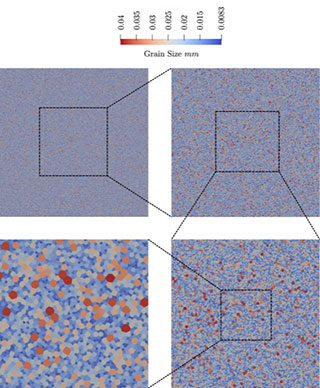Open PhD position: AI and digital twins in metallurgy – Front-tracking modeling of evolving interface networks
CEMEF PhD thesis: AI and digital twins in metallurgy - Front-tracking modeling of evolving interface networks.
Objective of work and context
One of the European Union’s objectives in climate change consists of reaching net-zero greenhouse gas emissions by 2050. Such perspective puts the metallic materials industry, as a large contributor to carbon emissions, under tremendous pressure for change and requires the existence of robust computational materials strategies to enhance and design, with a very high confidence degree, new metallic materials technologies with a limited environmental impact. From a more general perspective, the in-use properties and durability of metallic materials are strongly related to their microstructures, which are themselves inherited from the thermo-mechanical treatments.
Hence, understanding and predicting microstructure evolutions are nowadays a key to the competitiveness of industrial companies, with direct economic and societal benefits in all major economic sectors (aerospace, nuclear, renewable energy, and automotive industry).
Multiscale materials modeling, and more precisely simulations at the mesoscopic scale, constitute the most promising numerical framework for the next decades of industrial simulations as it compromises between the versatility and robustness of physically based models, computation times, and accuracy. The digimu con- sortium is dedicated to this topic at the service of major industrial companies.
In this context, the efficient and robust modeling of evolving interfaces like grain boundary networks is an active research topic, and numerous numerical frameworks exist. In the context of hot metal forming and when large deformation of the calculation domain and the subsequent migration of grain boundary interfaces are involved, a new promising, in terms of computational cost, 2D front tracking method called ToRealMotion algorithms [1,2] was recently developed.
Detailed presentation
This PhD will be dedicated to the use of different deep neural network (DNN) strategies for different applications. First, a supervised neural network-based remeshing strategy will be developed to improve the computational cost and efficiency of numerous remeshing operations used in the Lagrangian ToRe- alMotion method. Secondly, supervised deep neural network strategies and deep reinforcement learning strategies will be trained on a large numerical database built in the project thanks to the new efficient ToRealMotion calculation capabilities and also enriched with experimental data already available among the partners. Thanks to this, the acceleration of R&D calculations by coupling mesoscopic computations with automatically proposed mesoscopic results coming from the trained DNN will be investigated. Moreover, automatic interpretation of some microstructural singularities will also be tested. The developments will be validated thanks to pre-existing experimental and numerical data concerning the evolution of grain boundary interfaces during recrystallization and related phenomena for different materials. They will also be integrated in the DIGIMU® software.

Large 2D polycrystal composed of 560000 grains considered for grain growth modeling with ToRealMotion algorithms.
References:
[1] S. Florez, K. Alvarado, and M. Bernacki. Modelling and Simulation in Materials Science and Engineering, In press, 2021.
[2] S. Florez, K. Alvarado, D. Pino Muñoz and M. Bernacki. Computer Methods in Applied Mechanics and Engineering, 367:113107, 2020.
Candidate profile and skills
Degree: MSc or MTech in Applied Mathematics, with excellent academic record.
Skills: Numerical Modeling, programming, proficiency in English, ability to work within a multi-disciplinary team.
General informations
- Industrial field: Numerical Mathematics, High Performance Computing and Data
- Location: Mines Paris - CEMEF, Sophia Antipolis
- Keywords: Digital twins, AI, Computational Metallurgy, Interface networks, Front tracking, ToRealMotion algorithms, Mesh based algorithms, Deep learning strategy.
- Partners: Aperam, Arcelor-Mittal,CEA, Constellium, Transvalor, SAFRAN, AUBERT& DUVAL, framatome.
- Annual gross salary: about 28,5k€
- Duration: 3 years from October 2023
CEMEF team
Metallurgy μStructure Rheology (MSR) research team under
the supervision of Prof. M. Bernacki
To apply
- papers requiered to apply:
- your most recent CV
- Detailed, official proof of your grades during your most recent studies(maximum 3)
- One or more references from professors or heads of training programmes
Subject description :


 [upload]
[upload]